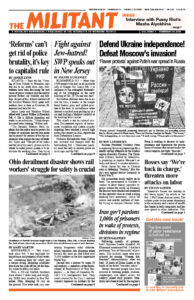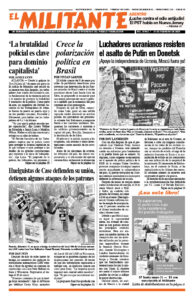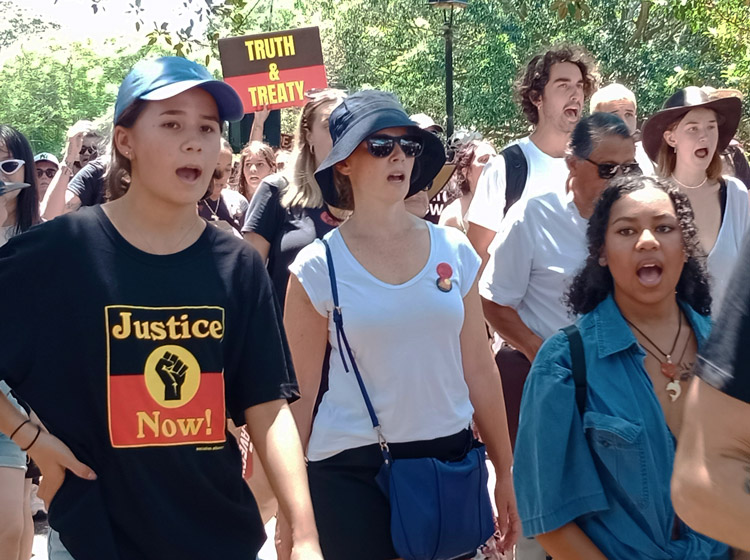SYDNEY — Tens of thousands demonstrated across Australia in support of Aboriginal rights and against racism Jan. 26. The rallies are held each year as a counter-observance to “Australia Day” — a national holiday of events organized by the country’s rulers to celebrate the founding of the first British settlement at Sydney in 1788. From here, British colonial rule took over the continent by forcibly displacing the indigenous peoples, out of which emerged today’s capitalist nation-state.
This year’s protests were marked by debate over moves by the federal government to hold a referendum later this year to establish a constitutional body known as “the Voice.” It is intended to “advise” the government and Parliament, purportedly on behalf of Australia’s indigenous peoples.
The protests also coincided with the government’s announcement of restrictions on the sale of alcohol in Alice Springs, a city in the Northern Territory, where authorities blame Aboriginal youth for an alleged “crime wave.”
Up to 10,000 people attended the Jan. 26 protest rally and march here. Speakers noted the continuing dispossession and pollution of Aboriginal lands; high imprisonment rates, including of children as young as 10 years old; Black deaths in custody; removal of Aboriginal children from their parents; high unemployment and poverty rates; low life expectancy; and other examples of the racial oppression of Aboriginal people.
“For 235 years there has been a pattern of violence against Aboriginal people,” Leetona Dungay told the rally. Her son, David Dungay Jr., was killed by guards at Sydney’s Long Bay jail in 2015. “Over the last 30 years nearly 700 indigenous people have died in custody and no one has ever been held accountable.”
“We will not celebrate land theft, murder and rape on Jan. 26,” said Paul Silva, David Dungay’s nephew. The anniversary is called Invasion Day by many Aborigines, whose forebears spread across Australia more than 60,000 years ago.
Supporters of the Communist League campaign in upcoming elections for the New South Wales Parliament joined the protest and also campaigned at the Yabun Festival, a major Aboriginal cultural event held nearby.
Speaking at a Militant Labor Forum two days later, Robert Aiken, Communist League candidate for Blacktown, in western Sydney, said claims of an Aboriginal youth “crime wave” were being hyped in other parts of Australia, not only Alice Springs.
“There is a real social crisis for Aboriginal communities,” he said, “but this crisis is a product of capitalism. Unemployment is reportedly 90% in some Town Camps, the impoverished Aboriginal communities on the outskirts of Alice Springs.”
The current Labor government’s response is a continuation over decades of successive government policies by both the conservative Liberal Party and Labor, he said. “They think they can arrest their way out of these problems. But the underlying social problems — lack of jobs, housing, public transport, health care, and many other issues — continue today despite decades of government programs.
“It is also necessary to confront the legacy of racism in Alice Springs and other towns where legal racial segregation existed into the 1960s,” he noted.
“What Aboriginal communities face is an extreme reflection of what confronts all working people,” Aiken said. “We need a union-led fight for jobs, with wage rates, work hours and conditions that enable our families to live and to engage in union and political activity, as well as for health care, housing and other social needs.”
The answer to this social crisis, he said, isn’t more welfare programs that sap workers’ self-confidence and make them dependent on the capitalist government. It’s breaking from the parties of the bosses and building our own party, a party of labor based on our unions, and fighting to take political power into our own hands.
Linda Harris, Communist League candidate for Liverpool in southwest Sydney, told the forum there had been an increase in union actions over the past year. She noted that growing military, trade and political conflicts around the world are a product of the imperialist world order coming apart. “Our campaign is fighting to build a working-class movement that offers a road forward,” she said. “We say, join us!”


